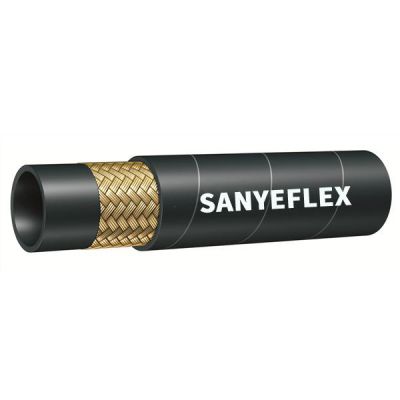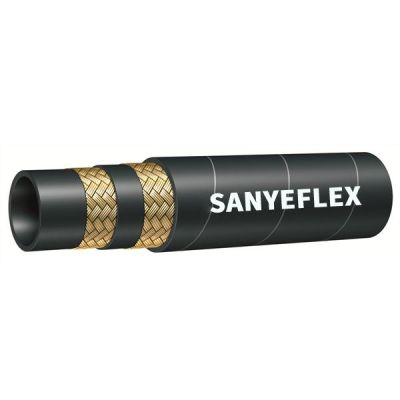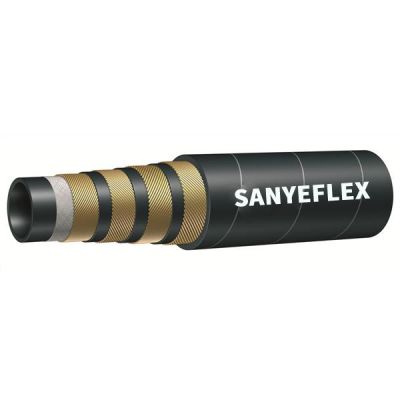May. 26, 2025
In the world of industrial fluid power systems, flexible hydraulic hoses are the lifelines that keep operations moving. These hoses play a critical role in transferring pressurized hydraulic fluid between system components, ensuring that everything from construction equipment to agricultural machinery operates efficiently and safely. But like all wear-and-tear components, hydraulic hoses have a service life—and knowing when to replace them can prevent costly downtime, system failure, or even accidents.
While many operators assume a hydraulic hose can last for years, several factors determine its longevity—usage frequency, operating pressure, temperature, fluid type, environment, and hose construction.
A general industry guideline is to inspect hoses every 6 months and replace them every 1 to 2 years, but this can vary drastically. In high-pressure, high-temperature environments, hose performance degrades more quickly. Hoses under constant bending or used in mobile machinery often experience accelerated fatigue.
At Hebei Sanye, our high-pressure, high-temperature flexible hydraulic hoses are built using a three-ply construction for maximum strength, flexibility, and pressure retention. Each hose consists of:
A flexible, fluid-resistant elastomer or thermoplastic core
One or more layers of steel wire braid or spiral wound wire (up to six layers) for reinforcement
A durable protective outer housing for resistance to abrasion, oil, weather, and temperature extremes
Some models also utilize textile reinforcements to reduce weight while maintaining flexibility. All hoses are engineered to meet or exceed SAE specifications, ensuring consistent performance across diverse industrial applications.
Not sure if your hose needs replacing? Watch for these warning signs:
Surface Cracks or Abrasions
External damage can allow contaminants to weaken the inner layers.
Fluid Leaks or Wetness at the Hose Ends
This often indicates a failing fitting or internal breach.
Kinks, Bubbles, or Flattened Areas
Structural deformities affect fluid flow and pressure retention.
Hardening or Brittleness of the Outer Layer
Usually due to prolonged exposure to high temperatures or chemical attack.
Pressure Loss in the System
Reduced system efficiency may be traced to hose fatigue or internal collapse.
Age-Based Preventive Replacement
Even if a hose “looks fine,” its internal integrity may be compromised after a certain period, especially in demanding environments.
Construction Equipment: 12–18 months, due to vibration and exposure
Agriculture Machinery: Seasonal inspection; replace every 1–2 years
Mining and Heavy Industry: Every 12 months, or sooner if pressure cycles are extreme
Hydraulic Presses and Industrial Systems: 2–3 years with controlled environments
Delaying hose replacement can lead to:
Sudden hose failure, resulting in equipment shutdown or safety incidents
Hydraulic fluid leakage, harming the environment and increasing cleanup costs
Damage to adjacent components, such as valves, pumps, and cylinders
Production downtime, which could cost thousands per hour
Preventive maintenance always costs less than emergency repairs.
Hebei Sanye Fluid Technology Co., Ltd. stands out with its strong R&D capabilities, automated production lines, and decades of technical expertise in hydraulic and refrigeration systems
Advanced Construction: Up to 6 layers of spiral wire for extreme pressure
OEM-Grade Quality: All hoses meet SAE and international certifications
Custom Engineering: Tailored hose assemblies for specific industry needs
In-House Testing: Every batch undergoes pressure and endurance tests
Fast Turnaround: Automated production ensures timely delivery
Our technical teams, including more than 40 engineers, work closely with clients to optimize hose selection, assembly, and lifecycle management—helping you avoid premature failure and optimize equipment performance.
Use Hose Tags or Serial Numbers
Track installation dates and inspection schedules.
Train Maintenance Staff
Proper routing, clamping, and storage practices extend hose life.
Partner with Reliable Suppliers
Source hoses from manufacturers with full traceability and engineering support.
Schedule Preventive Replacements
Based on system pressure, operating hours, and environmental stress.
Flexible hydraulic hoses, though often overlooked, are mission-critical components in industrial systems. Regular inspections and timely replacements ensure not only performance but also the safety of your team and the longevity of your machinery.
If you're unsure about your current hose condition or want to explore more durable, high-performance options, contact our team at Hebei Sanye Fluid Technology Co., Ltd. We’re here to provide professional service, custom engineering, and long-term reliability you can trust.
Our Customer
Tel.: +86 400 0318 111
Email: admin@sanyeflex.com
Add.: #218 Zhongke Street, High-tech Zone, Hengshui City, Hebei Province, China


